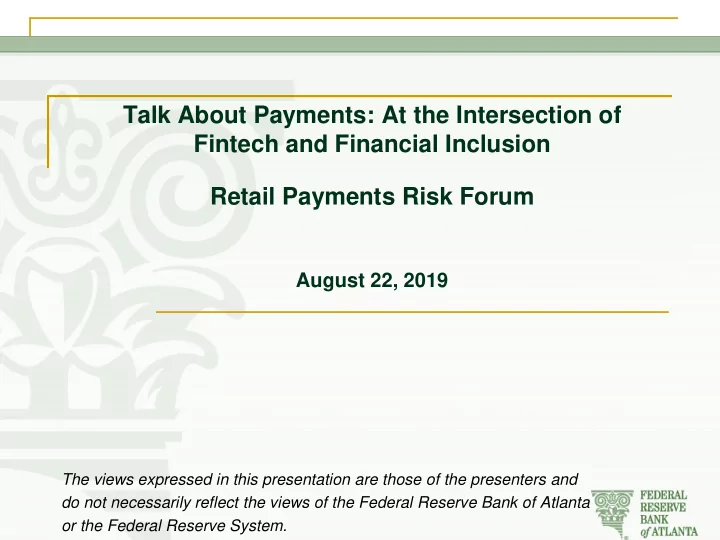

Talk About Payments: At the Intersection of Fintech and Financial Inclusion Retail Payments Risk Forum August 22, 2019 The views expressed in this presentation are those of the presenters and do not necessarily reflect the views of the Federal Reserve Bank of Atlanta or the Federal Reserve System.
Connection Information Webinar Link https://www.webcaster4.com/Webcast/Page/577/31220 Choose to listen with your PC speakers If you are having trouble hearing through your speakers Call-in Number: 888-625-5230 Participant Code: 91445224# Ask a Question Click the “Ask Question” button in the webinar tool Email rapid@stls.frb.org 2
Today’s Speakers Sophia Anong, PhD Nancy Donahue Catherine Thaliath 3
Retail Payments Risk Forum Mission Detect and identify, assist and encourage Identify what? Risk in existing and emerging retail payments Help how? Contribute to mitigating payment risks by: Researching products, services, and systems Collaborating with the industry Convening Take On Payments weekly blog Talk About Payments webinar series Retail Payments Risk Forum website 4
What Is Financial Inclusion? World Bank’s definition: Financial inclusion means that individuals and businesses have access to useful and affordable financial products and services that meet their needs — transactions, payments, savings, credit and insurance — delivered in a responsible and sustainable way. Financial inclusion is a key enabler to reducing poverty and boosting prosperity. Source: World Bank 5
Today’s Speakers Sophia Anong, PhD Nancy Donahue Catherine Thaliath 6
Unbanked vs. Underbanked Unbanked: Underbanked: Those who do not have a Those who have a bank checking, savings, or account but also use an money market account alternative service product to conduct certain financial transactions through providers other than traditional banks and credit unions Source: Report on the Economic Well-Being of U.S. Households in 2018, Board of Governors of the Federal Reserve System, May 2019 7
Common Reasons Cited for Being Unbanked Source: 2017 FDIC National Survey of Unbanked and Underbanked Households, FDIC, October 2018 8
Seven Needs of Underserved Consumers Source: Opportunities for Mobile Financial Services to Engage Underserved Consumers, FDIC, May 2016 9
Today’s Speakers Sophia Anong, PhD Nancy Donahue Catherine Thaliath 10
Unbanked Rates by Household Age and Year (Percent) 14.0 12.0 10.0 8.0 6.0 4.0 2.0 0.0 15 to 24 years 25 to 34 years 35 to 44 years 45 to 54 years 55 to 64 years 65 years or more 2015 2017 Source: 2017 FDIC National Survey of Unbanked and Underbanked Households, FDIC, October 2018 11
Underbanked Rates by Household Age and Year (Percent) 35.0 30.0 25.0 20.0 15.0 10.0 5.0 0.0 15 to 24 years 25 to 34 years 35 to 44 years 45 to 54 years 55 to 64 years 65 years or more 2015 2017 Source: 2017 FDIC National Survey of Unbanked and Underbanked Households, FDIC, October 2018 12
Financial Products Used by the Underserved Source: Opportunities for Mobile Financial Services to Engage Underserved Consumers, FDIC, May 2016 13
Financial Providers Used by the Underserved Non-bank Prepaid card Banks deposit account companies companies Payday lenders Retailers and pawn shops Source: Opportunities for Mobile Financial Services to Engage Underserved Consumers, FDIC, May 2016 14
A Sample of Solutions Currently in the Marketplace 15
Mobile Phone Ownership and Financial Usage by Banking Status Mobile phone ownership by banking status Mobile banking and payments use by banking status Source: Consumers and Mobile Financial Services 2016, Board of Governors of the Federal Reserve 16 System, March 2016
Today’s Speakers Sophia Anong, PhD Nancy Donahue Catherine Thaliath 17
Federal Reserve Payments Study: 2018 Annual Supplement Results General purpose prepaid debit grew almost 19% by number from 2016 to 2017. This type outpaces the growth rate of all other card types. Source: The Federal Reserve Payments Study: 2018 Annual Supplement, December 2018 18
Federal Reserve Payments Study – Fraud Report Results Prepaid debit card payments fraud accounted for 5% of the total fraudulent debit card payments by number in 2016. Source: Changes in U.S. Payments Fraud from 2012 to 2016: Evidence from the Federal Reserve Payments Study, Board of Governors of the Federal Reserve Systems, October 2018 19
Consumer Financial Protection Bureau – 2018 Prepaid Amendments to the 2016 Prepaid Rule Protection from unauthorized charges and errors Clear, uniform disclosure charts Provide warning if not FDIC insured Basic account information for free Choice for employees and recipients of certain government benefits Limits on overdraft fees and features Public and consumer access to account agreements and fee schedules Effective April 1, 2019 20
2019 Diary of Consumer Payment Choice Results This year’s Diary, based on 2018 data, reported debit cards as the most frequently used payment instrument for the first time. Debit cards accounted for 28% of payments. Cash was a close second, used 26% of the time. 49% of transactions under $10 were conducted using cash. Source: 2019 Findings from the Diary of Consumer Payment Choice 21
Current Solutions That Help Facilitate E-commerce and Online Shopping for Cash Users 22
Resources World Bank Economic Well-Being of U.S. Households, May 2019, Board of Governors of the Federal Reserve System Opportunities for Mobile Financial Services to Engage Underserved Consumers, May 2016, FDIC Alabama Governor Signs Two Broadband Bills Into Law, May 2019, TR Daily HUD ConnectHome Program Consumers and Mobile Financial Services, March 2016, Board of Governors of the Federal Reserve System National Survey of Unbanked and Underbanked Households, October 2018, FDIC Federal Reserve Payments Study Survey and Diary of Consumer Payment Choice EconomicInclusion.gov (FDIC) Financial well-being survey data, Consumer Financial Protection Bureau The Little Data Book On Financial Inclusion, 2018, World Bank Group 23
Questions or Comments Ask a Question Click the “Ask Question” button in the webinar tool Email a Question rapid@stls.frb.org Contact Today’s Speakers Sophia Anong Nancy Donahue Catherine Thaliath 24
Thank You for Participating in Today’s Webinar Please take a moment to complete the post- session participant survey, which will be sent via email. 25
Recommend
More recommend